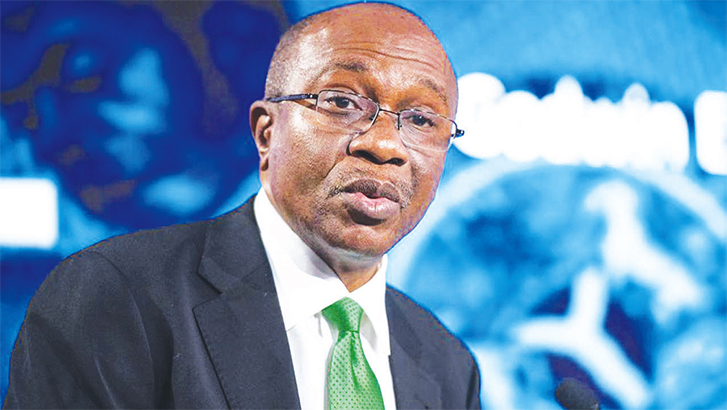Mr Godwin Emefiele assumed duties on June 4, 2014, as the 11th Central Bank of Nigeria CBN Governor and its 10th indigenous head, with a firm promise to operate a people-oriented monetary policy administration.
At his maiden world press conference, on June 5, 2014, Emefiele unveiled a 10-point agenda, insisting on running a central bank that is professional, apolitical, and people-focused.
“I want a central bank that spends its energies on building a resilient financial system that can serve the growth and development needs of our beloved country, Nigeria”, he said.
He went ahead to walk the talk but was soon confronted with global economic tremors which precipitated a 60 per cent slump in crude oil prices and a dig into the nation’s purse.
Soon after, the country slumped into a recession, the first time in a quarter of a century.
Confronted with these litany of challenges, Emefiele designed a bouquet of intervention programmes aimed at strengthening the Micro Small and Medium-sized Enterprises (MSMEs).

The programmes were designed in such a way that political interference was minimal to ensure they succeeded.
This firm stand on driving policies that won’t be hijacked by politicians makes him a reformer that has been mostly misunderstood.
Given his pedigree, Emefiele was brought on board critical reforms at the Bank and built on the policies of his predecessors and chose development financing as his focal point.
To him, the CBN was to act as a financial catalyst by targeting strategic sectors that could create jobs on a huge scale and reduce the country’s import bills.
In June 2015, the Central Bank of Nigeria (CBN) excluded 43 hitherto imported goods from accessing foreign exchange at the Nigerian foreign exchange markets.
But many ill-informed analysts tagged it corporate rascality and a veiled plot to run genuine importers out business.
Emefiele, who was undeterred, said there was no way the apex bank could sustain funding food imports for a population of over 200 million, when there is in-country capacity to grow the food items.
That was how the Anchor Borrower’s Programme (ABP), an intervention scheme aimed at solving the food insufficiency nightmare and creating massive employment, was born.
However, with the twin-blight of the COVID-19 pandemic and the Russia-Ukraine war, which have disrupted global supply chains and shrunk food productivity, Emefiele is now being applauded as a visionary leader who saw tomorrow and prepared for it.
This is because many countries have been forced to limit export of food items to meet local demands, having recorded a shaky exit from COVID-19-induced recession and its concomitant shutdowns.
The unsavoury development puts any import-reliant country in dire straits as getting food supplies has become a tough order and obviously more expensive, with a heavy strain on foreign reserves.
So, in line with the incumbent administration’s mantra of growing what the nation consumes and consuming what it grows, the ABP has recorded progress in the local cultivation of over 10 crops, including rice, other grains and oil palm.
Between January and February 2023, the Bank disbursed N12.65 billion to three agricultural projects under the Anchor Borrowers’ Programme (ABP), bringing the cumulative disbursement under the Programme to N1.09 trillion to over 4.6 million smallholder farmers cultivating or rearing 21 agricultural commodities on an approved 6.02 million hectares of farmland across the country.

The bank also released the sum of N23.70 billion under the N1.0 trillion Real Sector Facility to eight (8) new real sector projects in agriculture, manufacturing, and services. Cumulative disbursements under the Real Sector Facility currently stands at N2.43 trillion, disbursed to 462 projects across the country, comprising 257 manufacturing, 95 agriculture, 97 services and 13 mining sector projects. Under the 100 for 100 Policy on Production and Productivity (PPP). The Bank also released N3.01 billion under the Nigerian Electricity Market Stabilisation Facility (NEMSF-2) for capital and operational expenditure of distribution companies (Discos) aimed at improving their liquidity status and aid their recovery of legacy debt. This brings the cumulative disbursement under the facility to N254.39 billion.
Indeed, Emefiele, having survived many banana peels and corporate bullets since assumption of office, is faced with a similar situation today, as lobbyists salivating over his position in the incoming administration are working assiduously to taint his image by skirting around the reforms he has executed at the CBN.
Many are hammering on the recent naira redesign policy which has come with loaded benefits after the initial pain.
SOURCE: SUNNEWS
Read Also: Uphold Your Integrity: NITP Tasks Members




